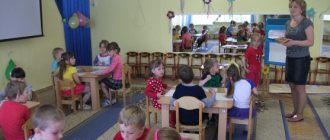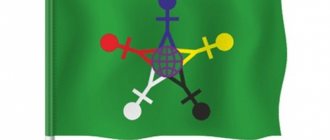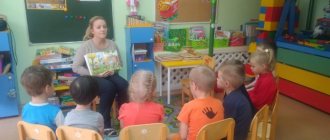In recent days, I have received many questions about our new notes and therefore I decided to tell you more about them. In addition, in this article you will find links to 12 full lesson notes on early development, English, school preparation, entertaining geography, a “science laboratory”, as well as for a children’s art studio and an acting studio.
Notes on developmental activities in English for 4-6 years old
Have you already experienced how difficult it is to find a good English teacher? Even from their student days, beginning “Englishmen” (if they have at least some teaching spark) acquire private practice. They are either not eager to find a job in a children's center, or they are asking for too high a salary.
Another problem is that many young teachers “tutor” quite well, that is, they conduct individual lessons. They are used to starting from the level of one particular student and adapting to him. But they have no idea what to do with a group when they need to hold the attention of several children at once, whose levels may vary slightly. It often turns out like this: a teacher is working with one child, while the rest are bored or, conversely, “standing on their ears.” Even if children are recruited into such groups, they do not stay for long.
Therefore, I organized the creation of notes for beginning English teachers and teachers without experience working in groups.
What can you say about these notes? Our experience in conducting English classes (since 2008) shows that it is very important for parents that classes are conducted not according to an artisanal (as they believe) home-grown methodology created by domestic craftsmen, but according to a respectable British or American method.
On the other hand, a textbook alone is absolutely not enough to conduct 50-minute lessons (as a rule, a textbook lesson is designed for 20-30 minutes). Even with the help of the Teacher's Guide (teacher's manual), the lessons are not rich and interesting enough.
That's why we decided to write notes. The textbook from the respected Longman publishing house – Wonderland Pre-Junior and its CDs were taken as a basis. An experienced teacher-methodologist supplemented it with a detailed description - how the teacher meets children, what games are used when greeting and for “warming up”, what creative and developmental tasks we perform during the lesson, additional vocabulary is given. Along with the notes, you will receive the author's applications for carrying out the exercises. Exercises from the textbook are approximately 10-15% of the lesson.
That is, using notes, you conduct not just English classes, but a comprehensive developmental lesson in English - with exercises for attention, memory, thinking, fine motor skills, with musical pauses and creative work.
This course was compiled by a teacher-methodologist with 13 years of experience working with preschool children. Therefore, the notes provide for situations when children do not want to complete this or that task, when children become bored and what needs to be done to prevent the lesson from being disrupted. In such cases, the teacher has a whole arsenal of games presented in the notes; he can quickly replace the task with another, without giving the slightest opportunity for the children to lose interest in the lesson. Also, notes provide for frequent changes in types of activities, which helps maintain the constant interest of children and prevents them from getting tired of the lesson.
Another advantage of the finished course is its applications. The teacher is freed from searching and constantly copying various books; everything necessary is already included in each lesson. The teacher can only prepare the necessary toys and make games for children from the proposed applications.
I repeat that the lesson taught using these notes is not just an English lesson, but a developmental lesson in English. This can become a competitive advantage that will distinguish your course and your club from competitors.
View an example of a summary in English →
In addition to our notes, for conducting classes you will also need:
- Textbook Wonderland: Pre-Junior: Pupil's Book (preferably for each student)
- One CD of English Adventure Starter A Songs for use in the classroom
- Super Simple Songs.
Summary of the introductory lesson to the program “In Search of Treasure”; for children 5-6 years old
Zainullina Aigul Borisovna,
additional education teacher
Center for additional education for children "Rainbow",
Langepas town of Khanty - Mansi Autonomous Okrug - Ugra
The topic of the lesson is “In search of treasure”
Introductory lesson for the additional educational program “Developing Together”
Children's age is 5-6 years.
Type of lesson:
game - journey
Time
lesson duration: 25 minutes
Purpose of the lesson:
to awaken in children a cognitive interest in developmental activities, in completing tasks and exercises for the development of the child’s cognitive and intellectual sphere.
Tasks:
Developmental
- Development of attention, observation, memory, imagination.
- Development of fine motor skills of the hands.
- Development of movement coordination.
- Stimulation of speech activity.
Educational
- Creating conditions for children to get to know the teacher.
- Children's ability to work in a team.
Necessary equipment for the lesson:
chest, wood, key, parts from the key, tape recorder, magnetic board, magnets, forms with the labyrinth task, pencils, jump rope, tape, card, letter.
Progress of the lesson.
1. Organizational moment. Welcome speech from the teacher.
The teacher meets the children in the group.
— Hello, my name is Aigul Borisovna! To make it easier for us to communicate, let's stand in a circle (children stand in a circle).
— Tell me, please, what do people do first when they meet? CHILDREN'S RESPONSES.
- That's right, HEALTHY! What does “HEALTH” mean? CHILDREN'S RESPONSES.
Saying hello means wishing you health! Let's wish everyone around the world good health! Repeat after me: (welcome ritual).
- Hello, golden sun! (everyone raises their hands, then lowers them).
- Hello, the sky is blue! (everyone raises their hands, then lowers them).
- Hello, free breeze! (swing their arms).
- Hello, little white snowball! (movement of hands, show snow).
- Hello everyone! (everyone spreads their arms to the sides, then lowers them).
2. Exercise to develop the articulatory apparatus.
- I hope you and I will become friends! Tell me, where does friendship begin? CHILDREN'S RESPONSES.
— Friendship begins with a smile. Let's smile at each other. Well done! And now he’ll repeat after me: I’ll smile at my neighbor! (3-4 times).
And once again give your kindest smile to your neighbors.
3. Announcement of the topic. Explanation of new material.
- Well, we met and became friends. While I was waiting for you, they brought me a letter, it was sent by the Good Witch, and I haven’t had time to read it yet. Let's read it now.
“In the magical forest, the Evil Wizard buried a treasure. Only the most friendly children will be able to find this treasure. When you find a treasure, you will become more attentive, think even better, remember more, you will be able to learn a lot of interesting things... But to find it, you need to pass tests. And to make it easier for you to find the treasure, I’m giving you a map.”
— Do you agree to go on a trip to the Magic Forest? (Children's answers)
3.1. Exercise "Transitions".
Target:
development of attention to each other, group cohesion, coordination of movements.
- Well, let's hit the road. Stand behind each other. With one hand, grab each other's belt, and with the other, hold onto the ribbon. There is no need to separate your hands. We hold on to each other and don’t let go of the ribbon. Ready? (children walk in place, repeating TOP-TOP-TOP - let's go on a hike). Go!
The teacher becomes the first. Light background music is playing. Children walk around the hall and approach the river.
— The first obstacle is “River”, we need to cross it.
3.2. Exercise “River” takes place to cheerful music.
Target:
creating a cheerful mood.
Instructions:
a deep river flows here. We need to cross it and not get our feet wet. Stand one after another, take turns jumping from one bank to the other. Please do not jostle and wait your turn, otherwise you may get your feet wet. Ready?
Time spending
3 min.
“So we crossed the river, none of us got our feet wet.” We have become bolder. But look at the map! There is a high mountain ahead. We need to fly over it.
3.3. Exercise “Who flies?” Target:
development of motor-motor attention.
Instructions:
I will name words that can fly or cannot fly. If you hear a word that can fly, answer: “flies” - and show how it’s done - spread your arms to the sides like wings. If I ask you: “Does the pig fly?”, be silent and do not raise your hands.
List of words: dove, snake, sofa, butterfly, chafer, chair, ram, swallow, plane, tree, seagull, house, sparrow, ant, mosquito, boat, iron, fly, table, dog, carpet, helicopter.
Time spending
4 min.
- Well done, you completed this task, and we flew safely over the mountain and became more attentive. But look at the map - another difficult task lies ahead. The evil wizard tried very hard and confused the tracks so that we could not find the treasure. But you and I are attentive and brave, and we can overcome all difficulties. There's a labyrinth ahead.
To complete this task you need to sit down at your tables.
Do you know WHAT IS A MAZE? (these are many roads mixed up with each other. But there is a path that will lead you out of the maze).
3.4. Exercise "Labyrinth". Target:
development of attention, thinking, hand motor skills.
Instructions:
each of you will receive a piece of paper with a labyrinth. Look how confusing the roads are. You need to find the way to the tree under which the treasure is buried. Go straight along the road, no need to jump over or climb over walls. Draw the road first with your finger, and then, when you find the road, draw it.
Execution time: 1-2 min.
- Great, everyone was able to get out of the maze and find the way to the tree under which the treasure was buried. And here is the chest. But it's closed. And to open it, you need a key. The Evil Wizard did his best here too. He took our key apart. We need to collect it. Each of you takes one piece from the broken key, and put the key together.
3.5.
Exercise “Collect the key.” Goal: development of thinking, attention, group cohesion.
The children are given cut pieces of the key. They need to collect it (collectively, at one of the tables).
Time: 2-3 minutes.
- The key is collected, now we can open the chest.
“But to open the chest, you need to say magic words.” Repeat after me: Key - one, two, three! Unlock the lock for us!
4. Surprise moment.
They open the chest. There are books with tasks for children. Look through the activity book with your children.
- Please tell me why the Good Witch called these books a treasure? CHILDREN'S RESPONSES.
— These books contain the most interesting tasks for you. By completing these tasks, you will be able to become more attentive, learn to think and fantasize even better, and begin to remember better.
- It's time for us to return. I suggest that you do not return along the difficult road, but make a space flight. You will now lie down on the carpet, make yourself comfortable, relax and close your eyes.
5. Relaxation break “Space flight”
(space music plays for 1 minute).
Target:
Relieving tension and excitement in children.
One, two, three, opened their eyes. We looked around. Here we are again in kindergarten.
6. Summing up. Fixing the material.
— Did you like our trip? Why did we go on this journey? What helped us find the treasure? What is this treasure for?
7. Exercise “Sunshine”
(held in the center of the room).
“Now it’s time to say goodbye.” Please go to the center of the hall. Stand in a circle. Stretch your hands forward and join them in the center of the circle. Let's stand quietly and feel like a warm ray of sunshine.
- Thank you very much for the lesson. If you liked our lesson, I’m waiting for you at the Rainbow Center for Continuing Education. Goodbye.
Bibliography:
- Artsishevskaya I.L. Psychologist's work with hyperactive children in kindergarten. – M.: Knigolyub, 2003.
- Notes of integrated classes in the preparatory group of kindergarten. Cognitive development. Speech development. Literacy training: A practical guide for preschool teachers // Auth. Comp. Adzhi A.V. – Voronezh: TC “Teacher”, 2006.
Acting notes
Many of us know how shyness and lack of self-confidence can bring internal suffering and objectively interfere with success in school, in a career, in communicating with friends and in our personal lives.
Achievements in study and work largely depend on the ability to present oneself in a favorable light, win over interlocutors, speak clearly and expressively, and speak in front of a large audience.
And in relationships with loved ones and friends, it is very important to be able to listen and hear, to convey your thoughts and emotions.
Children learn all this in the theater studio. These activities help children “open up”, live in harmony with themselves and be happy.
An example of a summary here →
Notes on preparing for school for ages 6-7 years for reading children
The second year of teaching children under the “Preparing for School” program is designed for children who came to your classes at the age of 5-6 years, and are now ready to continue their education at another level of preparation for school, age 6-7 years.
Practice shows that at this stage of education new children will definitely appear who have already reached the age of 6-7 years and want to attend a school preparation course in your children's club. Many of them may not be able to read and have minimal knowledge of mathematics.
When planning classes, this fact must be taken into account, because all children will have to study together, in one group. As our teachers note, this has benefits for everyone, both new children and those who already attended your classes last year. New children acquire new knowledge and learning skills, while “old” children consolidate and improve their skills.
This year, a lot of work is planned on the phonetic side of the Russian language, much attention is paid to sound-letter analysis and synthesis. Children learn to distinguish vowel sounds from consonants, to give a detailed description of sounds ([z] - consonant, paired hard (soft), paired voiced; [a] - vowel, unstressed (stressed)).
Such concepts as stress, stressed-unstressed syllable are introduced. The ability to determine the number of syllables by the number of vowels is being developed. The simplest concepts of parts of speech are given, work is being done on sentences, the ability to compose stories from pictures, and retelling.
To strengthen reading skills, it is recommended to read short texts and stories, with mandatory analysis of reading comprehension, answers to questions and retellings.
In the “Mathematics” course, work continues on the numbers of the first ten, the ability to write numbers and mathematical signs is consolidated, the skills of oral and written calculations are improved, the composition of numbers, comparisons of numbers, the ability to solve problems and write down its solution are worked out, the structure of the problem is worked out, work is underway on geometric material, tasks for the development of logic and thinking are selected.
Children get acquainted with the formation of numbers of the second ten, Roman numerals. The concepts of kilogram, gram, centimeter, the concept of angles, etc. are introduced. The skills to draw and measure segments, the ability to distinguish them from a straight line, a ray are formed.
IMPORTANT! One more organizational point. Some clubs for the “School Preparation” course prefer to use handout sheets printed on the club printer. Others use ready-made textbooks and copybooks. We belong to the latter group, since we considered that printing black and white sheets, and even more so color pictures, in the club throughout the year is much more expensive than a one-time purchase of copybooks. However, work is now underway to draw special worksheets for these notes. And when this work is completed, we will offer all owners of the notes and our illustrations. You will be able to choose whether to work according to the instructions we provide or print out handout sheets developed by our methodologists for each lesson.
View an example of a school preparation plan for 6-7 years old →
Free notes for classes with children in various areas
- Abstract on early development for ages 1-1.5 years
- Abstract on early development for ages 1.5-2 years
- Abstract on early development for ages 2-3 years
- Summary of comprehensive development for ages 3-4 years
- Summary of comprehensive development for ages 4-5 years
- Notes on preparing for school for ages 5-6 years
- Notes on preparing for school for ages 6-7 years
- English language notes for ages 4-6 years
- Abstract on entertaining geography for ages 4-7 years
- Notes on the course “Scientific Laboratory” for ages 5-7 years
- Drawing notes for ages 5-7 years
- Notes for an art studio (batik, iso-modeling, floristry - paper flowers, decoupage, sand painting, cardboard modeling) for ages 4-6 years
- Notes for classes in an acting studio for ages 3-6 years
If you liked any of these notes, you can purchase a complete set from us for the course that interests you.
Temporary plan for developmental classes in the preparatory group
A lesson with children 6–7 years old lasts 30 minutes and, as in other age groups, consists of four stages:
- organizational, designed to motivate guys to work (up to 3 minutes);
- the main one, which develops the topic using different methods and techniques, and also includes a physical education pause (up to 12 minutes);
- stages of consolidating the material, that is, practicing new material in tasks of a practical nature (up to 10 minutes);
- the final stage, at which the teacher and children evaluate their activities (up to 5 minutes).
This is interesting. The consolidation stage may not be allocated separately, but fits into the topic development stage.
All stages of topic development must fit into the timing of the lesson in the preparatory group, that is, 30 minutes





